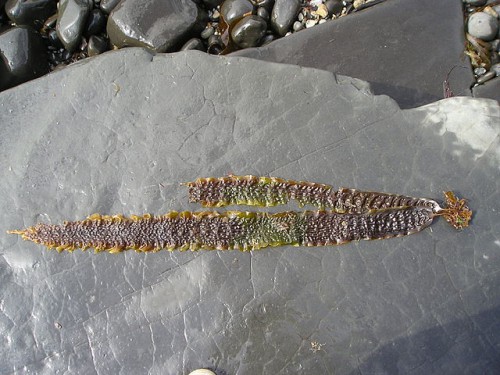HUGE forests of seaweed could be planted around Scotland’s coasts to battle pollution from fish farms.
A study has found the algae thrive on the nutrients from fish excretions and fish food produced by fish farms.
Researchers at the Scottish Association for Marine Science (Sams) carried out the test by planting seaweed close to fish farms in Badcall Bay and Calbha in northwest Scotland.
They found one species of seaweed, Saccharina latissima, removed 12% of waste from farmed salmon.

The growth of the seaweed near the farms was compared to a control site of seaweed away from fish farms.
The Crown Estate is now pressing ahead with plans to create Scotland’s first seaweed farm, to tap into seaweed’s commercial potential.
It is hoped a seaweed farm would allow the plant to be exploited commercially as it is in China as well as tackle pollution.
Seaweed can be used in food, cosmetics and medicine, and researchers are looking into using it as bio-fuel.
Dr Adam Hughes, a researcher and lecturer in sustainable aquaculture at Sams, said: “This study really shows what a win-win solution growing seaweed alongside salmon cages can be for the Scottish aquaculture industry; it reduces the environmental footprint of salmon production and provides the industry with another high-quality product.
“Seaweed is a valuable resource, found in a range of everyday products. This approach offers the industry a chance to diversify and expand.”
He added seaweed also absorbed chemicals from agricultural run-off and chemicals used to treat waste water.
These can include nitrogen phosphorous.
China produces 9million tons of seaweed commercially every year, about half the world’s total.
A seaweed farm at Sanggou Bay, in the northeast of the country, has rafts and ropes stretching for six miles.
The by-products of fish farming can cause an ‘algal bloom’ when they enter ecosystems.
This causes certain algae to thrive and others to die, creating a build-up of bacteria.
It is thought craeful harvesting of the seaweed could prevent algal blooms creating ‘dead zones,’ where a lack of oxygen has killed other marine life.
The Crown Estate and the Scottish Government said they were looking into ways of exploiting Scotland’s seaweed.
A spokesman for the Crown Estate said: “We see further commercial potential in seaweed around Scotland and are exploring this.”
A Scottish Government spokesman said: “We support multi-trophic aquaculture, where a by-product can be recycled as a food source for other species.
“We are carrying out a strategic environmental assessment for seaweed cultivation.”
Another recent experiment to combat pollution from fish farms saw wild salmon being ‘armour plated’ to prevent sea lice infection.
A medication called SLICE prevented the wild salmon from being infected by fish-farmed salmon when they swan out to sea.

